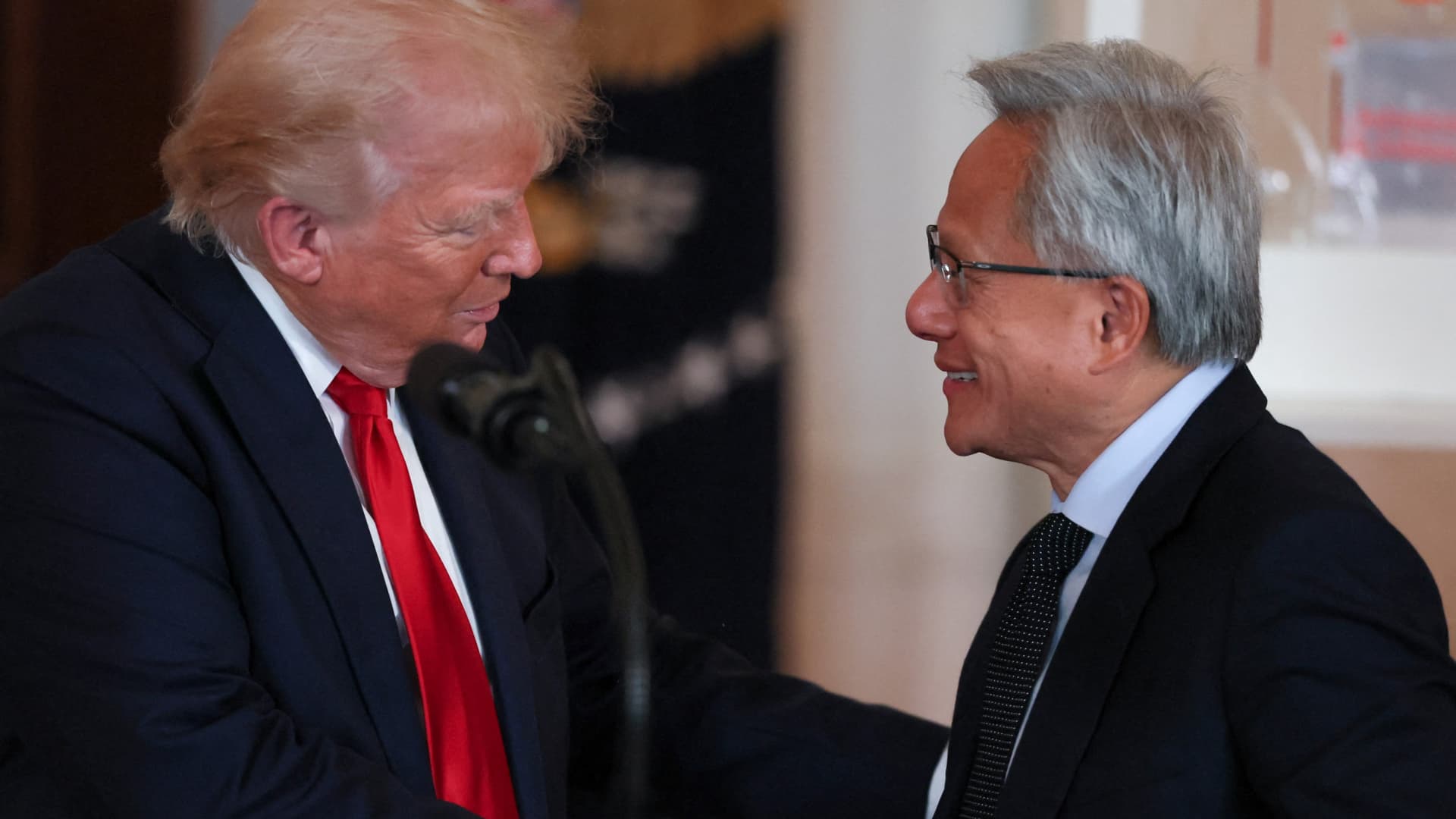NVIDIA CEO Jensen Huang and U.S. President Donald Trump shake hands at an ‘Investing in America’ event in Washington, D.C., U.S., April 30, 2025.
Leah Millis | Reuters
The “Magnificent Seven” group of stocks — comprising Alphabet, Amazon, Apple, Meta Platforms, Microsoft, Nvidia and Tesla — drove much of the S&P 500’s sterling 23.31% gain in 2024.
They have also been some of the hardest stocks hit by U.S. President Donald Trump’s tariffs. Those that rely heavily on global supply chains and export markets, such as Apple and Nvidia, suffered the most. By contrast, Meta and Microsoft, which derive more of their revenue from digital services, such as ad sales or enterprise software, actually saw their shares head upward this year.
On Wednesday, Nvidia joined Meta and Microsoft to become the third member of the Magnificent Seven to trade in the green year to date. It’s a significant move because the chipmaker — as the word suggests — doesn’t deal in intangible products that can slip through trade barriers.
Nvidia’s recovery suggests that dealmaking under Trump — in terms of tariff agreements and broad bilateral ties, such as those he is forging with Saudi Arabia on his state visit — is providing businesses with a better environment. But it also emphasizes how volatile the market can be this year, when the engine behind 2024’s blistering rally can sputter out within the weeks surrounding Trump’s “Liberation Day.”
What you need to know today
Three-day winning streak for S&P 500
U.S. markets traded mixed Wednesday. The S&P 500 ticked up 0.1% and the Nasdaq Composite rose 0.72%. The tech-heavy index was lifted by a 4.7% rise in AMD shares after the chip company announced a $6 billion share buyback as well as a jump in Nvidia shares. The Dow Jones Industrial Average lost 0.21%. The pan-European Stoxx 600 dipped 0.24%, ending its four-day winning streak. Burberry shares surged 17% after announcing cost cuts and a turnaround plan.
Nvidia is back in the green
Nvidia on Wednesday climbed more than 4% on the back of news that it would sell more than 18,000 of its top artificial intelligence chips to Saudi Arabia. The share move puts Nvidia into positive territory for the year, becoming the latest “Magnificent 7” member stock to return to the green amid the broader market’s recovery. Amazon, Alphabet, Tesla and Apple are still facing year-to-date losses in their share prices.
Largest deal for Boeing and Qatar Airways
Boeing and Qatar Airways on Wednesday announced a deal for the Middle Eastern airline to buy up to 210 jets during Trump’s state visit with the emir of Qatar. The order, which is the biggest in Qatar Airways’ history — and for Boeing, according to Trump — is a boost to the beleaguered planemaker, which hasn’t posted a profit since 2018.
‘I like you too much’: Trump to Saudi crown prince
At the U.S.-Saudi Investment Forum on Tuesday that was attended by CEOs such as Tesla’s Elon Musk, Nvidia’s Jensen Huang and BlackRock’s Larry Fink, Trump gave a speech in which he praised Saudi Arabia and told the country’s Crown Prince Mohammed bin Salman — who was in the audience — “I like you too much.” Trump also met with Syrian leader Ahmed al-Sharaa in Saudi Arabia the same day.
AI shrank Klarna’s workforce
Klarna CEO Sebastian Siemiatkowski told CNBC the company has cut its workforce “from about 5,000 to now almost 3,000 employees” — that’s a reduction of around 40% — because of investments in artificial intelligence and natural attrition in its workforce. The company said last year that AI was doing the work of 700 customer service agents. Klarna paused its initial public offering after Trump announced tariffs.
[PRO] Stocks could retest April lows: Steve Cohen
Steve Cohen, founder of investment firm Point72, said he thinks stocks could “go back toward the lows” in April and that there’s a 45% chance of a recession. Cohen, however, said a decline in the stock market would not necessarily be a “calamity.”
And finally…
U.S. President Donald Trump (L) listens as Nvidia CEO Jensen Huang speaks in the Cross Hall of the White House during an event on “Investing in America” on April 30, 2025 in Washington, DC.
Andrew Harnik | Getty Images
Trump administration’s next wave of China AI chip export rules are yet another obstacle for Nvidia
Nvidia announced an agreement with Saudi Arabia on Tuesday to develop the kingdom’s artificial intelligence capabilities, a sign of its expanding global strategy.
As Nvidia CEO Jensen Huang was in Saudi Arabia announcing the Blackwell deal, the Trump administration released a new round of AI chip restrictions targeting China. The Commerce Department issued a warning against the use of U.S. AI chips for Chinese models and singled out “diversion tactics” and securing supply chains to target smuggling.
The new export restrictions came days after the U.S. and China agreed to pause most tariffs on each other. With the White House also eliminating the “AI Diffusion Rule,” the new policies add another layer of controls for Nvidia to navigate.





